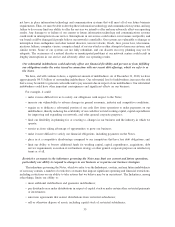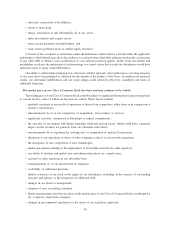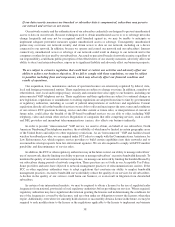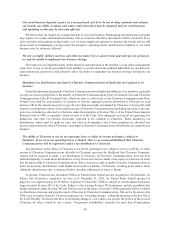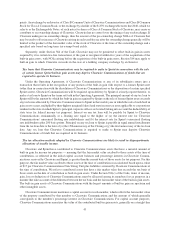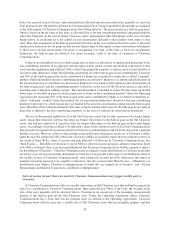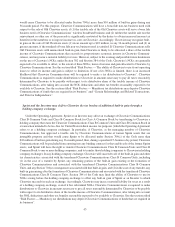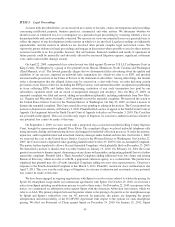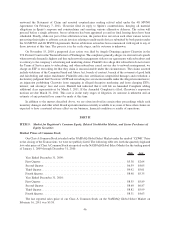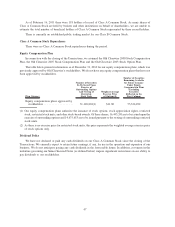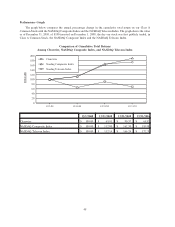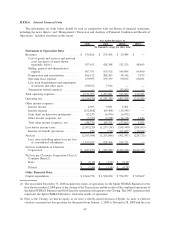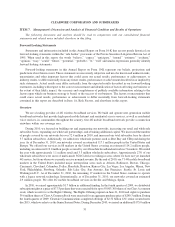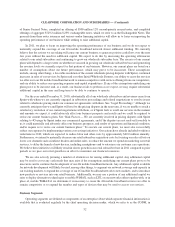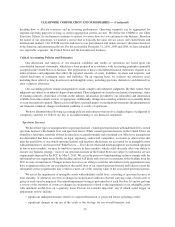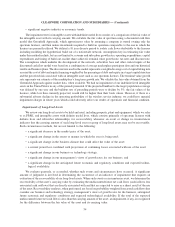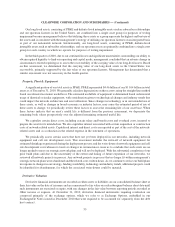Clearwire 2010 Annual Report Download - page 50
Download and view the complete annual report
Please find page 50 of the 2010 Clearwire annual report below. You can navigate through the pages in the report by either clicking on the pages listed below, or by using the keyword search tool below to find specific information within the annual report.ITEM 3. Legal Proceedings
As more fully described below, we are involved in a variety of lawsuits, claims, investigations and proceedings
concerning intellectual property, business practices, commercial and other matters. We determine whether we
should accrue an estimated loss for a contingency in a particular legal proceeding by assessing whether a loss is
deemed probable and can be reasonably estimated. We reassess our views on estimated losses on a quarterly basis to
reflect the impact of any developments in the matters in which we are involved. Legal proceedings are inherently
unpredictable, and the matters in which we are involved often present complex legal and factual issues. We
vigorously pursue defenses in legal proceedings and engage in discussions where possible to resolve these matters
on terms favorable to us. It is possible, however, that our business, financial condition and results of operations in
future periods could be materially and adversely affected by increased litigation expense, significant settlement
costs and/or unfavorable damage awards.
On April 22, 2009, a purported class action lawsuit was filed against Clearwire U.S. LLC in Superior Court in
King County, Washington by a group of five plaintiffs from Hawaii, Minnesota, North Carolina and Washington
(Chad Minnick, et al.). The lawsuit generally alleges that we disseminated false advertising about the quality and
reliability of our services; imposed an unlawful early termination fee, which we refer to as ETF; and invoked
unconscionable provisions of our Terms of Service to the detriment of subscribers. Among other things, the lawsuit
seeks a determination that the alleged claims may be asserted on a class-wide basis; an order declaring certain
provisions of our Terms of Service, including the ETF provision, void and unenforceable; an injunction prohibiting
us from collecting ETFs and further false advertising; restitution of any early termination fees paid by our
subscribers; equitable relief; and an award of unspecified damages and attorneys’ fees. On May 27, 2009, an
amended complaint was filed and served, adding seven additional plaintiffs, including individuals from New Mex-
ico, Virginia and Wisconsin. On June 2, 2009, plaintiffs served the amended complaint. We removed the action to
the United States District Court for the Western District of Washington. On July 23, 2009, we filed a motion to
dismiss the amended complaint. The Court stayed discovery pending its ruling on the motion. The Court granted our
motion to dismiss in its entirety on February 2, 2010. Plaintiffs filed a notice of appeal to the Ninth Circuit Court of
Appeals. Oral argument before the Ninth Circuit Court of Appeals took place on November 3, 2010. The Court has
not yet ruled on the appeal. This case is in the early stages of litigation, its outcome is unknown and an estimate of
any potential loss cannot be made at this time.
On September 1, 2009, we were served with a purported class action lawsuit filed in King County Superior
Court, brought by representative plaintiff Rosa Kwan. The complaint alleges we placed unlawful telephone calls
using automatic dialing and announcing devices and engaged in unlawful collection practices. It seeks declaratory,
injunctive, and/or equitable relief and actual and statutory damages under federal and state law. On October 1, 2009,
we removed the case to the United States District Court for the Western District of Washington. On October 22,
2009, the Court issued a stipulated order granting plaintiff until October 29, 2009 to file an Amended Complaint.
The parties further stipulated to allow a Second Amended Complaint, which plaintiffs filed on December 23, 2009.
We then filed a motion to dismiss that was fully briefed on January 15, 2010. On February 22, 2010 the Court
granted our motion to dismiss in part, dismissing certain claims with prejudice and granting plaintiff leave to further
amend the complaint. Plaintiff filed a Third Amended Complaint adding additional state law claims and joining
Bureau of Recovery, which we refer to as BOR, a purported collection agency, as a co-defendant. The parties have
stipulated that plaintiff may file a Fourth Amended Complaint adding two new class representatives. Clearwire’s
response to the Fourth Amended Complaint is due March 3, 2011. Plaintiffs’ motion for class certification is due
April 7, 2011. This case is in the early stages of litigation, its outcome is unknown and an estimate of any potential
loss cannot be made at this time.
We have been engaged in ongoing negotiations with Sprint to resolve issues related to wholesale pricing for
Sprint 4G smartphone usage under our commercial agreements with Sprint. On October 29, 2010, we received a
notice from Sprint initiating an arbitration process to resolve these issues. On November 22, 2010, in response to the
notice, we commenced an arbitration action against Sprint with the American Arbitration Association, which we
refer to as AAA. The primary dispute between the parties relates to the pricing to be paid to us for smartphone usage
by Sprint and Sprint’s subscribers over our 4G network. In particular, the parties are disputing the proper
interpretation and enforceability of the 4G MVNO Agreement with respect to the options for such smartphone
pricing. We filed our Statement of Claim against Sprint on December 14, 2010. On January 21, 2011, Sprint
45


